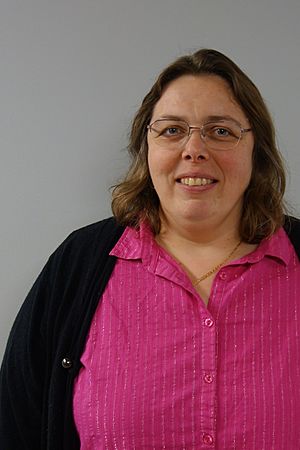Patricia Bouyer-Decitre facts for kids
Patricia Bouyer-Decitre (born in 1976) is a brilliant French computer scientist. She is famous for her work on special computer systems called timed automata, checking how computer models work (called model checking), and temporal logic, which is about how computers understand time. She is a top researcher at the French National Centre for Scientific Research (CNRS). She also leads a special lab called the Formal Methods Lab at CNRS and the École normale supérieure Paris-Saclay.
Contents
Becoming a Computer Scientist
Patricia Bouyer was born in 1976. She started studying at a famous school in France, ENS Paris-Saclay, in 1996. There, she earned several degrees.
- In 1997, she got a master's degree in mathematics.
- In 1998, she earned another master's degree in computer science.
- In 1999, she passed a tough exam called the agrégation in mathematics, which allows you to teach at a high level.
Advanced Studies and Research
Patricia finished her Ph.D. in 2002. Her Ph.D. was about "Models and Algorithms for Checking Timed Systems." This means she studied how to make sure computer systems that depend on time work perfectly.
After her Ph.D., she worked as a researcher in Denmark for a short time. In 2002, she became a junior researcher for CNRS in France. She worked very hard and was promoted to a senior researcher in 2010.
What Patricia Bouyer-Decitre Discovered
Patricia Bouyer-Decitre is well-known for her important discoveries about timed automata. These are like special computer programs that deal with time.
Understanding Timed Automata
- She helped figure out what kinds of problems timed automata can solve. This was in a paper she wrote with other scientists in 2003.
- With her colleagues, she found ways to connect timed automata to different types of computer languages. This was similar to a famous idea in computer science called Kleene's theorem.
- She also helped create "updatable timed automata." These are like advanced timed automata that can change their timing rules, not just reset them. She found out when it's possible to check if these new automata are working correctly.
Working with Temporal Logic
Patricia also worked on temporal logic. This is a way for computers to reason about time.
- She showed that one type of temporal logic, called "timed propositional temporal logic," is more powerful than another, called "metric temporal logic." This means it can describe more complex time-related ideas.
Other Research Areas
Her research also includes:
- Using timed automata to find problems or "faults" in computer systems.
- Adding ideas like costs and energy use to timed automata.
- Looking at how timed automata can be used in game theory, especially to find fair outcomes (called Nash equilibria).
Awards and Recognition
Patricia Bouyer-Decitre has received important awards for her work:
- In 2007, she won the CNRS Bronze Medal. This is a special award from the French National Centre for Scientific Research.
- In 2011, she won the Presburger Award. This is a very important award given by the European Association for Theoretical Computer Science to young scientists who have made outstanding contributions.
 | Calvin Brent |
 | Walter T. Bailey |
 | Martha Cassell Thompson |
 | Alberta Jeannette Cassell |


